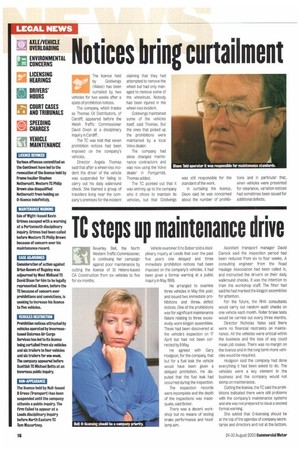TC steps up maintenance drive
Page 18

If you've noticed an error in this article please click here to report it so we can fix it.
AilBeverley Bell, the North Western Traffic Commissioner, is continuing her campaign against poor maintenance by cutting the licence of St Helens-based CA Construction from six vehicles to five for six months.
Vehicle examiner Eric Bober told a disciplinary inquiry at Leeds that over the past five years one delayed and three Immediate prohibition notices had been imposed on the company's vehicles. It had been given a formal warning at a public inquiry in May1999.
He arranged to examine three vehicles in May this year, and issued two immediate prohibitions and threedefect notices. One of the prohibitions was for significant maintenance failure relating to three excessively worn kingpin assemblies. These had been discovered at the vehicle's inspection on 17 April but had not been corrected by 9 May.
He agreed with Gary Hodgson, for the company, that but for a fuel leak the vehicle would have been given a delayed prohibition. He disputed that the fuel leak had occurred during the inspection.
The inspection records were incomplete and the depth of the inspections was inadequate, said Bober.
There was a decent workshop but no means of testing brake performance and headlamb aim. Assistant transport manager David Darock said the inspection period had been reduced from six to four weeks. A consulting engineer from the Road Haulage Association had been called in, and instructed the drivers on their daily walkround checks. It was the intention to train the workshop staff. The fitter had said he had marked the kingpin assemblies for attention.
For the future, the RHA consultants would carry out random audit checks on one vehicle each month. Roller brake tests would be carried out every three months.
Director Nicholas Yates said there were no financial restraints on maintenance. All the vehicles were critical within the business and the loss of any could mean job losses. There was no margin on the licence and in the long term more vehicles would be required.
Hodgson said the company had done everything it had been asked to do. The vehicles were a key element in the business and the company would not skimp on maintenance.
Cutting the licence, the TO said the prohibitions indicated there were still problems with the company's maintenance systems and she was not prepared to issue a second formal warning.
She added that 0-licensing should be at the top of the agendas of company secretaries and directors and not at the bottom.








































































































